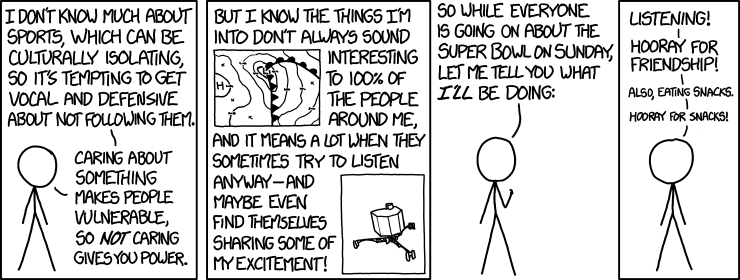There are certain advantages to having "popular" interests. You have a much easier time finding other people who want to talk about your interests. A lot more money is devoted to developing products related to your interests. If you like popular music, you can expect it to be played in retail outlets and nightclubs. So on and so forth.
What are "geek" interests? There isn't any precise definition, but we have a wide array of prototypes. There's sci-fi. Fantasy. Anime. Trading card games. Dungeons and Dragons. Video games. Comic books. Science.
At some earlier point in time, all of these things were niche interests, primarily loved by geek subcultures. However, "geek" does not necessarily imply "niche", and so they may persist in being geeky, even if they do not persist in being niche. In fact, it seems like several of the prototypes I listed are now quite popular.
Blockbuster
films have very high budgets, and must be supported by a
very popular consumer base. The infographic on the right is a list of upcoming comic book movies from IO9. I also show GTAV, one of the best-selling video games of all time, and also one of the most expensive.
If something like Lord of the Rings has vastly more cultural currency than it once did, you might guess that most of the new fans are no longer from the geek subculture. But so what? That's what cultural hegemony is. Even people who are not part of your subculture now feel compelled to recognize the value of your subculture's interests. Your interests are now popular, and you gain all the associated advantages. Good for you.
If I sound unsympathetic, it's probably because my biggest geeky interests have not attained a similar degree of popularity. I'm mostly a math geek. I like game theory, set theory, real analysis, origami, and logic puzzles. I have been incidentally interested in sci-fi, but I've never been particularly enthusiastic about it.
From SMBC

Click for bigger original, from XKCD. My reaction to this comic was that I'd prefer it if people were neither obligated to listen to football, nor to geeky interests they don't care about. For instance, my dear readers are never forced to read every part of my blog.
One
of the antitheses of geek culture is football culture.*
Stereotypically, geeks dislike football, which is fair enough. Football
is injurious to its players, a waste public resources, and most
unforgivable of all, incredibly boring. But most things that have
cultural hegemony are obnoxious when they don't personally interest you.
*That's American football, to all the non-US people.
Maybe
it's just because I talk to more geeks than sports fans, but I personally
think sci-fi fans are far more obnoxious than football fans. I
can't count the number of times I've been told that I absolutely must
see Star Wars, and must read Lord of the Rings or Dune
or whatever.
I'm kind of reactionary about it. I tell people that I actively
dislike the "classics". (Since I'm ace, I privately draw a comparison
between the cultural dominance of sci-fi and the cultural dominance of
sex.)

Click for bigger original, from XKCD. My reaction to this comic was that I'd prefer it if people were neither obligated to listen to football, nor to geeky interests they don't care about. For instance, my dear readers are never forced to read every part of my blog.
Perhaps
one of the worst examples of geek cultural hegemony is in video games.
Because the video game market has space for relatively few big-budget games, geeks are incredibly possessive of the medium. Something
like two thirds of US households play video games, and yet geeks complain
endlessly that it doesn't count because they aren't the right kinds of
video games (because they're casual, or indie, or Call of Duty,
or sports games, or Nintendo). This amounts to having cultural
hegemony, and yet still complaining that it's not nearly enough.
Geeks
are frequently defined by their opposition to popular culture and
appreciation of more niche cultures. But now that geeks are taking over
popular culture, the question is, have geeks learned anything
whatsoever about how to be popular without being an asshole about it?











2 comments:
In case you didn't see this: The Packers of Catan
have geeks learned anything whatsoever about how to be popular without being an asshole about it?
Has anyone, ever?
Post a Comment